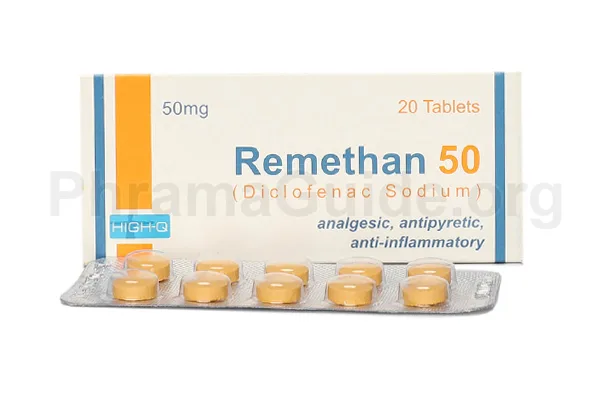Remethan tablet is primarily used in conditions like arthritis, musculoskeletal pain, and edema. It is a nonsteroidal anti-inflammatory drug that is used to relieve pain and reduce inflammation. Following are some common (approved) and off-label (clinically trialed) uses of Remethan tablets:
Common Uses of Remethan Tablet
- Pain Relief: Remethan tablet is used to relieve pain, including musculoskeletal pain, joint pain, back pain, dental pain, and postoperative pain.
- Inflammation Reduction: Using Remethan tablets helps to reduce inflammation and swelling associated with various inflammatory conditions. It can be used for conditions like tendonitis, bursitis, synovitis, and other inflammatory disorders.
- Osteoarthritis: Remethan tablet is used for the relief of signs and symptoms of osteoarthritis, a degenerative joint disease. Using Remethan helps reduce joint pain, stiffness, and swelling, and improves physical function.
- Rheumatoid Arthritis: Remethan tablet is used for the treatment of rheumatoid arthritis, an autoimmune disease that causes chronic inflammation in the joints. Remethan helps alleviate joint pain, swelling, and stiffness and improves overall joint function.
- Ankylosing Spondylitis: Remethan tablet is used for the treatment of ankylosing spondylitis, a chronic inflammatory arthritis affecting the spine and sacroiliac joints. It helps reduce pain and stiffness and improves physical function in affected individuals.
- Acute Gout: Remethan tablet is indicated for the management of acute gout, a painful condition caused by the deposition of uric acid crystals in joints. It helps relieve pain, reduce inflammation, and improve mobility during gout attacks.
- Dysmenorrhea: Remethan tablets may also be used for the relief of pain and cramps associated with primary dysmenorrhea (menstrual pain) in women.
Off-label Uses of Remethan Tablet
- Migraine: Remethan tablets may be used off-label to treat acute migraines or tension headaches. It can help relieve headache pain and reduce associated symptoms, such as nausea and sensitivity to light and sound.
- Postoperative Pain: Remethan tablet is sometimes used to manage postoperative pain in various surgical procedures. It can help reduce pain and inflammation following surgeries, such as dental procedures, orthopedic surgeries, or minor surgeries.
- Sports Injuries: Remethan tablets may be used to alleviate pain and reduce inflammation associated with sports-related injuries, such as sprains, strains, or ligament damage.
- Chronic Pain Conditions: Remethan tablets may be used for chronic pain conditions that involve inflammation, such as chronic low back pain, fibromyalgia, or neuropathic pain. It may provide relief from pain and help improve physical function.

What is Remethan?
Remethan is one of the leading brands of Diclofenac Sodium, manufactured and marketed by High-Q Pharmaceuticals, Pakistan.
Remethan Alternatives : Other Similar Brands
The following are some alternative brands of Remethan and their manufacturers.
- Dicloran : Sami Pharmaceuticals, Pakistan.
- Phlogin : Brookes Pharmaceutical Laboratories (Pakistan) Ltd.
- Voltral : Novartis Pharma (Pakistan) Ltd.
- Artifen : Abbott Laboratories (Pakistan) Ltd.
- Voren : Asian Continental (Pvt) Ltd, Pakistan.
- Dyclo : Indus Pharmaceuticals, Pakistan.
- Fastaid : Platinum Pharmaceuticals, Pakistan.
- Mobikare : Barrett Hodgson (Pvt) Ltd, Pakistan.
- Arnil : Brookes Pharmaceutical Laboratories (Pakistan) Ltd.
- Panslay : Getz Pharmaceuticals, Pakistan.
- Motaar : Standpharm Pakistan (Pvt) Ltd.
- Orthofenac : Bosch Pharmaceuticals, Pakistan.
- Magnofenac : AGP (Pvt) Ltd, Pakistan.
Remethan : Available Formulations and Strengths
Presently, Remethan is available in Table and Injection Forms with the following strengths.
Remethan Tablet : 50mg strength
Remethan Injection : 25mg/ml strength
Who Should Not Use Remethan?
Remethan has certain contraindications, which are specific situations or conditions in which the use of the medication is not recommended due to potential risks.
Hypersensitivity: Remethan should not be used in individuals who have a known hypersensitivity or allergic reaction to diclofenac or any other NSAIDs. Allergic reactions can range from mild skin rashes to severe and potentially life-threatening conditions, such as anaphylaxis.
Asthma, Nasal Polyps, and Aspirin Allergy: Remethan is contraindicated in individuals with a history of asthma, chronic rhinitis, nasal polyps, or allergies to aspirin or other NSAIDs. These individuals may be at an increased risk of developing severe bronchospasm or other allergic reactions.
Active Gastrointestinal (GI) Bleeding or Ulcers: Remethan is contraindicated in individuals with active gastrointestinal bleeding or a history of peptic ulcers or gastrointestinal perforation. NSAIDs, including diclofenac, can increase the risk of GI bleeding, ulcers, and perforation.
Severe Renal Impairment: Remethan is contraindicated in individuals with severe renal impairment (creatinine clearance <30 mL/min) or end-stage renal disease. Diclofenac can further impair renal function and increase the risk of kidney damage.
Severe Hepatic Impairment: Remethan is contraindicated in individuals with severe hepatic impairment or active liver disease. Diclofenac can cause hepatotoxicity, including liver damage and liver function abnormalities.
Third Trimester of Pregnancy: Remethan is contraindicated during the third trimester of pregnancy as it may harm the developing fetus, affect fetal circulation, and delay labor.
What is the Recommended Daily Dosage of Remethan?
Remethan Dose for Pain and Inflammation:
- The typical starting dose for adults is one tablet of 50mg taken two to three times daily.
- The maximum daily dose is usually four tablets.
Remethan Dose for Osteoarthritis:
- The typical starting dose for adults is one tablet of 50mg taken two to three times daily.
- The maximum daily dose is usually three tablets.
Remethan Dose for Rheumatoid Arthritis:
- The typical starting dose for adults is one tablet of 50mg taken two to three times daily.
- The maximum daily dose is usually four tablets.
Remethan Dose for Ankylosing Spondylitis:
- The typical starting dose for adults is one or a half tablet of 50mg taken two to three times daily.
- The maximum daily dose is usually three tablets.
How Remethan Works?
Remethan works by inhibiting both COX-1 and COX-2 enzymes, although it has a higher affinity for COX-2. COX-1, which plays a crucial role in the production of prostaglandins, substances that contribute to inflammation, pain, and fever.

Leave A Comment